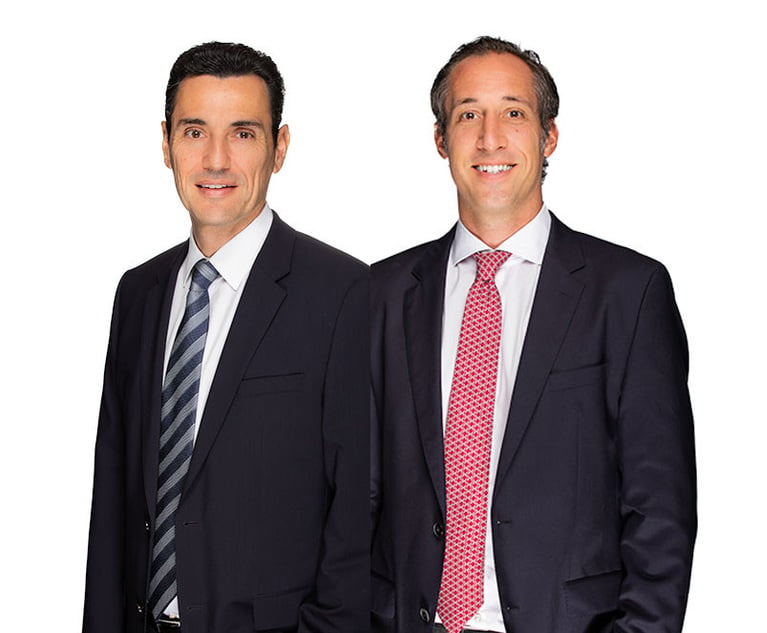New Boies Schiller Leaders Grapple With Defections, Pay
After a string of 2020 departures, the firm is evaluating partner pay, including whether to stick with a formula or adopt something new.
February 10, 2020 at 02:11 PM
5 minute read
The original version of this story was published on The American Lawyer
 Natasha Harrison and Nicholas Gravante of Boies Schiller Flexner. Photo: Carmen Natale/ALM
Natasha Harrison and Nicholas Gravante of Boies Schiller Flexner. Photo: Carmen Natale/ALM
With new leadership in place followed by a stream of departures, 2020 is shaping up as a year of significant change for Boies Schiller Flexner.
At least eight partners of about 150 have announced moves from the firm since the start of the year, including three spinning off from the Miami office. Even for January when year-end compensation is paid, the departure flow was high.
Coming just weeks after Nicholas Gravante and Natasha Harrison helped take the reins as additional managing partners, the spate of defections raised fresh questions about the firm's direction. Still, Gravante, Harrison and others said the exits will have no material effect on Boies Schiller's financial performance, and they plan to maintain the strategic vision of founders David Boies and Jonathan Schiller.
All of the departing lawyers cited distinct motivations — entrepreneurial drive, a desire to work at a more global firm, a better mesh of practice groups and priorities. But observers pointed to frustrations, especially among younger partners, with aspects of leadership and the firm's pay system.
In recent years, Boies Schiller undertook a detailed review of its compensation system, a black-box system that has fans and detractors. Some partners supported a model with compensation tiers or bands, said two sources familiar with the firm. A new system could have resulted in more compensation flowing to younger business generators.
No major changes came up for a vote last year, but Harrison said in a statement Monday that the firm's leaders still plan to consider broad changes to the firm's compensation model.
Meanwhile, two sources said Schiller remains heavily involved in the firm management. He said in an interview that he has been able to focus more on firm matters since his post as the chair of Columbia University's board of trustees ended in 2018. But he described his role more as a resource for Harrison and Gravante than as a hands-on manager.
'Nothing to Do With Leadership'
Recent partner exits included three prominent Boies partners who served in the Obama administration. Kathleen Hartnett, a former Justice Department attorney who was co-leader of the firm's San Francisco office, joined Cooley at the end of January as a partner. Lee Wolosky and Dawn Smalls, New York partners who are independent monitors overseeing Deutsche Bank's compliance with a major regulatory settlement, moved to Jenner & Block. Two sources said the annual revenue that could come from the compliance gig was upwards of $10 million.
Before those exits were known, two partner groups opened new firms. Heise Suarez Melville opened in Coral Gables, and Roche Cyrulnik Freedman was founded by a 15-attorney group in Miami and New York.
In interviews, Gravante said he views the exits as a sign of natural evolution.
"In the first generation of any law firm, there's a lot of personal loyalty to people who formed the firm," Gravante said. "Now that we are maturing … I believe institutional loyalty displaces personal loyalty to the founders. My sense is it is not as strong a bond as personal loyalty."
"We don't expect any drop in revenues as a result of these departures," Harrison added. "I believe very strongly it has nothing to do with leadership."
Harrison said it's true that a report had been prepared on the firm's compensation system, and the firm's executive committee is contemplating changes to its partner compensation formula, but stressed the need to move carefully.
"We are now taking a number of steps on this important issue," she said in the statement Monday. "The first step is reevaluating our equity allocation system. That is happening now, and the results should be determined by the end of the first quarter. The second step will involve the firm's leadership determining if the firm should continue with formula compensation with some changes or replace the system entirely with a different model."
It's not just partner compensation that's being discussed, she added, saying the firm's leaders are also considering "a variety of options" for associate compensation.
To be sure, no one has suggested that Boies Schiller's future is threatened. The firm reported a robust $420 million in revenue in 2018. Profit per equity partner is over $3 million, a status shared by only 20 law firms.
The firm lists 282 lawyers on its website.
Speaking generally on lateral exits in a January interview, Schiller said the people "who leave our firm aren't leaving because they're unhappy with our firm. They're leaving for some greener pasture." He added, "They want to go somewhere where they're given assignments and paid and don't have to worry about other things."
Read More:
Three Boies Schiller Partners Splinter Off To Create New Litigation Boutique
Boies Schiller Defectors Launch New Boutique — for Second Time This Month
This content has been archived. It is available through our partners, LexisNexis® and Bloomberg Law.
To view this content, please continue to their sites.
Not a Lexis Subscriber?
Subscribe Now
Not a Bloomberg Law Subscriber?
Subscribe Now
NOT FOR REPRINT
© 2025 ALM Global, LLC, All Rights Reserved. Request academic re-use from www.copyright.com. All other uses, submit a request to [email protected]. For more information visit Asset & Logo Licensing.
You Might Like
View All
Saul Ewing Loses Two Partners to Fox Rothschild, Marking Four Fla. Partner Exits in Last 13 Months
3 minute read
Calif. Fires Should Serve as a Reminder to Fla.’s Commercial Landlords and Tenants Not to Be Complacent
6 minute read
The Hidden Risks and Benefits of Investing in a Condo-Hotel or Branded Condominium Unit
9 minute readLaw Firms Mentioned
Trending Stories
- 1ACC CLO Survey Waves Warning Flags for Boards
- 2States Accuse Trump of Thwarting Court's Funding Restoration Order
- 3Microsoft Becomes Latest Tech Company to Face Claims of Stealing Marketing Commissions From Influencers
- 4Coral Gables Attorney Busted for Stalking Lawyer
- 5Trump's DOJ Delays Releasing Jan. 6 FBI Agents List Under Consent Order
Who Got The Work
J. Brugh Lower of Gibbons has entered an appearance for industrial equipment supplier Devco Corporation in a pending trademark infringement lawsuit. The suit, accusing the defendant of selling knock-off Graco products, was filed Dec. 18 in New Jersey District Court by Rivkin Radler on behalf of Graco Inc. and Graco Minnesota. The case, assigned to U.S. District Judge Zahid N. Quraishi, is 3:24-cv-11294, Graco Inc. et al v. Devco Corporation.
Who Got The Work
Rebecca Maller-Stein and Kent A. Yalowitz of Arnold & Porter Kaye Scholer have entered their appearances for Hanaco Venture Capital and its executives, Lior Prosor and David Frankel, in a pending securities lawsuit. The action, filed on Dec. 24 in New York Southern District Court by Zell, Aron & Co. on behalf of Goldeneye Advisors, accuses the defendants of negligently and fraudulently managing the plaintiff's $1 million investment. The case, assigned to U.S. District Judge Vernon S. Broderick, is 1:24-cv-09918, Goldeneye Advisors, LLC v. Hanaco Venture Capital, Ltd. et al.
Who Got The Work
Attorneys from A&O Shearman has stepped in as defense counsel for Toronto-Dominion Bank and other defendants in a pending securities class action. The suit, filed Dec. 11 in New York Southern District Court by Bleichmar Fonti & Auld, accuses the defendants of concealing the bank's 'pervasive' deficiencies in regards to its compliance with the Bank Secrecy Act and the quality of its anti-money laundering controls. The case, assigned to U.S. District Judge Arun Subramanian, is 1:24-cv-09445, Gonzalez v. The Toronto-Dominion Bank et al.
Who Got The Work
Crown Castle International, a Pennsylvania company providing shared communications infrastructure, has turned to Luke D. Wolf of Gordon Rees Scully Mansukhani to fend off a pending breach-of-contract lawsuit. The court action, filed Nov. 25 in Michigan Eastern District Court by Hooper Hathaway PC on behalf of The Town Residences LLC, accuses Crown Castle of failing to transfer approximately $30,000 in utility payments from T-Mobile in breach of a roof-top lease and assignment agreement. The case, assigned to U.S. District Judge Susan K. Declercq, is 2:24-cv-13131, The Town Residences LLC v. T-Mobile US, Inc. et al.
Who Got The Work
Wilfred P. Coronato and Daniel M. Schwartz of McCarter & English have stepped in as defense counsel to Electrolux Home Products Inc. in a pending product liability lawsuit. The court action, filed Nov. 26 in New York Eastern District Court by Poulos Lopiccolo PC and Nagel Rice LLP on behalf of David Stern, alleges that the defendant's refrigerators’ drawers and shelving repeatedly break and fall apart within months after purchase. The case, assigned to U.S. District Judge Joan M. Azrack, is 2:24-cv-08204, Stern v. Electrolux Home Products, Inc.
Featured Firms
Law Offices of Gary Martin Hays & Associates, P.C.
(470) 294-1674
Law Offices of Mark E. Salomone
(857) 444-6468
Smith & Hassler
(713) 739-1250







